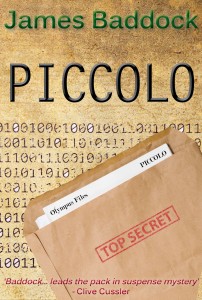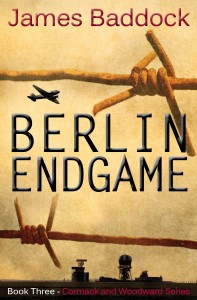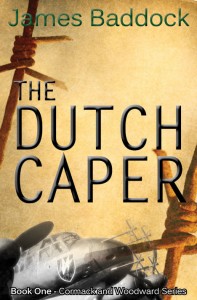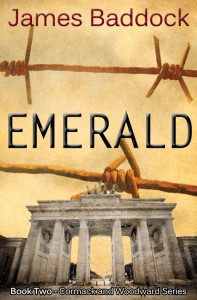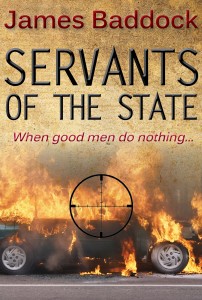 Servants Of The State is now out on Amazon – here.
Servants Of The State is now out on Amazon – here.
Category Archives: Books
State Of Play (9)
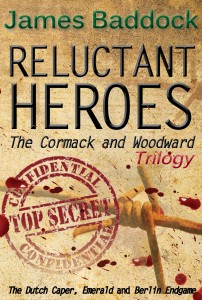 Reluctant Heroes is now available on Amazon here – they didn’t take long over that one at all!
Reluctant Heroes is now available on Amazon here – they didn’t take long over that one at all!
The Books: The Faust Conspiracy
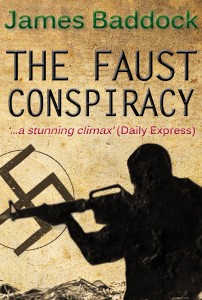 The Faust Conspiracy was my first book and went through umpteen rewrites before it was finally accepted for publication by Malvern Publishing, a small company that was on the lookout for new authors, but which has since gone out of business. I started on the book when I was recuperating after a minor operation (they call them procedures nowadays) and I was trying to read a not very good thriller. I commented to my better half that I could do better myself, so she challenged me to have a go. So I did. The idea was based on an old newspaper cutting recycled in the local press, describing how German paratroopers landed in the Luton Hoo estate during World War II and were promptly arrested before being taken off to London. The cutting did not deal with their subsequent fate and I began to wonder what they were doing there and what did finally happen to them…
The Faust Conspiracy was my first book and went through umpteen rewrites before it was finally accepted for publication by Malvern Publishing, a small company that was on the lookout for new authors, but which has since gone out of business. I started on the book when I was recuperating after a minor operation (they call them procedures nowadays) and I was trying to read a not very good thriller. I commented to my better half that I could do better myself, so she challenged me to have a go. So I did. The idea was based on an old newspaper cutting recycled in the local press, describing how German paratroopers landed in the Luton Hoo estate during World War II and were promptly arrested before being taken off to London. The cutting did not deal with their subsequent fate and I began to wonder what they were doing there and what did finally happen to them…
I wrote it in longhand, using a fountain pen and an awful lot of A4 paper, before typing it out, firstly using a typewriter (remember those?) and then on an Apple II computer, using Apple Writer. As the computer had an awesome 48K memory (well, it was awesome in those days), the text had to be saved chapter by chapter onto six 5.25 inch floppy disks (remember those as well?) before being printed out by a daisywheel printer onto fanfold paper, which took several hours, as I recall. Happy days…
It took seven years in the end for it to be published (in 1985), and it suffered numerous redrafts along the way. Entire sequences were edited out, as were characters, but the basic storyline – a plot to assassinate King George VI in 1944 – remained the same. However, before it finally saw the light of day, I had to find a publisher and I soon realised that, without a literary agent, I had little or no chance of achieving that – then as now, the fate of most unsolicited manuscripts received by any publisher was to be consigned to the ‘slush pile’, where it might be given a cursory reading by a junior employee, but, equally, it might simply be returned, unread, to the author several months down the line, accompanied by a form letter. I sent out letters to a number of literary agents listed in The Writers’ and Artists’ Yearbook (an invaluable resource even today) and one of them forwarded my name to Malvern Publishing, a small company based in Upton-on-Severn, which was just starting up with the noble (if perhaps quixotic) ambition of launching new authors. The Faust Conspiracy was the sixth book published by Malvern and was reviewed (very favourably) in the Daily Express. Despite this, it did not crash its way into the bestseller lists and any dreams that I had about retiring from teaching soon faded away.
Within a couple of years, however, the US rights were bought up by Walker Books in New York and The Faust Conspiracy, new cover and all, was released in the USA and Canada in 1989, achieving significantly more sales than in the UK (in fact, overall, I have sold considerably more books in the States than over here). Again, the royalties were not enough for me to retire, but they more than paid for a holiday for two that year.
With the passing of the years, however, I began to become more aware of Faust‘s weaknesses – there was too much exposition in the narrative, Vogel’s character was far too sketchy, the relationship between Paul and Carolyn did not make sense, Tyler was little more than a name and so on. As a result, when I decided to convert the books into ebook format, I initially decided not to include Faust in the process – there was too much that needed to be rewritten. But then I took another look at it and realised that there were enough ‘good’ bits to make it worth revisiting. Vogel was given a more detailed back story, the character of his co-conspirator was made more substantial, the romance between Paul (now renamed Keller) and Carolyn became a friendship but nothing more, Tyler was given added depth by the introduction of a sub-plot that threw light on his life outside MI5 and the narrative was adapted to reflect far more of a ‘show, don’t tell’ approach. The final result was that the book, which had always been on the short side at 56,000 words grew to over 73,000 and, IMHO, is all the better for it. So, although it’s taken over thirty years, The Faust Conspiracy has now finally been completed.
For now, anyway…
State Of Play (8)
The Faust Conspiracy is now out on Amazon, just here: http://www.amazon.co.uk/The-Faust-Conspiracy-ebook/dp/B00BSAYHA0/ref=sr_1_5?s=digital-text&ie=UTF8&qid=1363298313&sr=1-5
Reluctant Heroes
Just heard that the publishers want to release the three Cormack and Woodward books in a single edition – I’ve decided on the title Reluctant Heroes, because it sums them up, really. Cormack is not exactly champing at the bit over any of his undercover assignments (although he still takes them on) while Woodward, after The Dutch Caper, is more circumspect in his approach to them as well. However, both of them would be distinctly embarrassed at being described as ‘heroes’; they’d feel awkward at any medal presentation ceremony and they’d be the last ones to brag about it afterwards, so it struck me as being an appropriate title for their exploits.
Aimee‘s going to design the cover, as before, so it should be out pretty soon.
The Books: Piccolo
Piccolo took a long time to get going, really, in terms of writing. I’d had the idea for it after reading about a string of deaths of Ministry of Defence computer experts and the thought came to me: what if they weren’t accidents or suicide? For various reasons, it took a while for the storyline to take shape; the original main character (an ex-Falklands veteran called Curren) was ditched in favour of Special Branch Detective Inspector Redmond, which also meant a less ‘macho’ portrayal, and the bad guys in the early drafts (the KGB) were also shown the door as being too predictable – which meant that the sequences I’d roughed out for them also had to go. Even when I’d come up with the ‘real’ bad guys, I decided to keep their sequences down to a minimum – too much was being given away in terms of plot suspense.
I realised that most of the book had to be presented from the viewpoint of the two main characters, Redmond and his assistant, Gail Harper, in order to keep the central mystery (what is Piccolo?) unresolved for as long as possible. Also, changing from the Falklands veteran character meant that I could portray Redmond as a far less ‘heroic’ character, at least to begin with; in the opening chapters, his main concern is to turn in a whitewash report on the deaths in order to safeguard his own career. Gail is the more determined to find out the truth; she pushes Redmond into continuing the investigation when he’d much rather sign it off. Of course, it’s another variation on the ‘odd couple’ – they take a while even to be civil to each other, but, gradually, they become an effective team. This, in turn, raised the question of how far this thawing in their relationship should go – would there be the clichéd sex scene towards the end of the book when they discover their true feelings about each other? As soon as that question occurred to me (in that form), I decided that, while there would be a hint of an incipient relationship, that would be as far as it went; they would be utterly professional (because, when it comes right down to it, they both are). Eventually, although the writing process had been slow to start, it gathered momentum and ended up as a book that I was pleased with. Well, mostly… I eventually had second thoughts about the final, brief sequence, but that was not until much later.
It was never available in the UK in print – by then, I had parted company with my British publisher, not entirely amicably. Piccolo was published by Walker Books in the USA and by Thomas Allen and Son in Canada in 1992. Like its predecessors, it sold reasonably well without setting the heather on fire – but it was the last to be published in print. Walker Books had made the decision to scale back on fiction, so that avenue was now cut off. Other matters intruded; I still had a full time teaching career and I was moving up the promotion ladder, which was taking up more and more of my ‘free’ time. Although I wrote two more books in the following years (which were not published), in reality, my writing career came grinding to a halt.
So to the ebooks… What I did was to update Piccolo – the main thrust of the book could apply just as well to 2012 as the early 90s, so I introduced references to mobile phones, memory sticks, SD cards, etc, none of which made any significant impact on the story itself. What I did change, however, was the final sequence. In the print version, I was encouraged to identify the mysterious Beresford, on the basis that, if I were not going to write a sequel, I might as well reveal his identity, but I later thought that the revelation detracted from the main point of the segment, which was to point out just how high the conspiracy went. Plus, the ‘reveal’ didn’t really add up, either… So, in the ebook, I’ve restored the mystery, partly because, now, I am thinking about a sequel and I don’t intend Beresford to be who he’s supposed to be in the original book.
So what is the significance of the title? Why Piccolo? I can’t really tell you, not without giving too much away, but it was inspired by a World War II device called ‘Oboe’. Look it up if you like – or read the book…
State Of Play (7)
State Of Play (6)
State Of Play (5)
All of the Cormack and Woodward books (The Dutch Caper, Emerald and Berlin Endgame) are now out on Amazon, Kobo, W H Smith and iBooks – the links are all on the website homepage. (Now all we’ve got to do is sell them!)
State Of Play (4)
Aimee (theauthorworks.com) delivered the last book cover today – and a damn good one it is too! So here are all seven:
